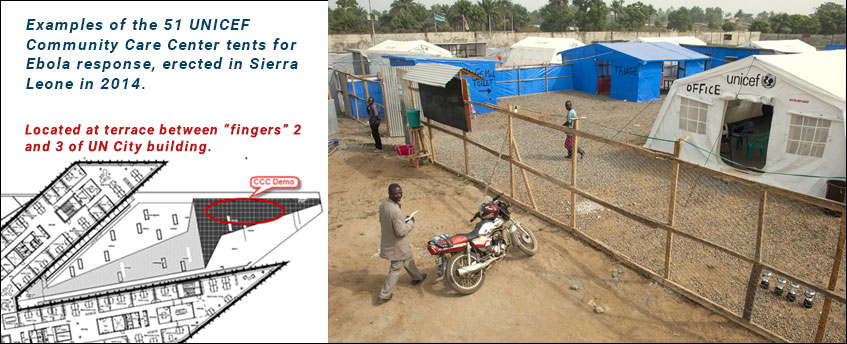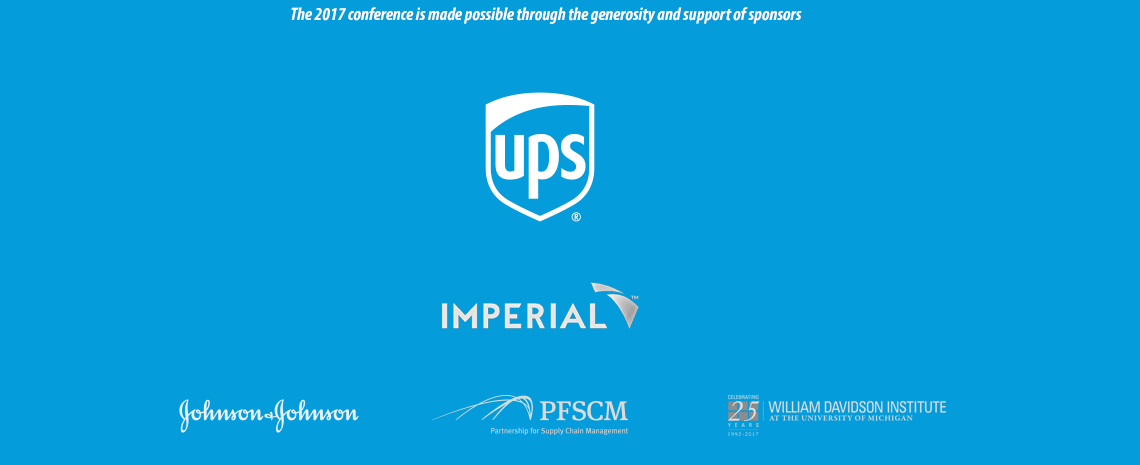UNICEF Ebola Community Care Center Tour

In Ebola-affected countries, Community Care Centers (CCCs) were vital to isolate and care for the sick wherever outbreaks occurred. A life-sized reconstruction of a UNICEF CCC brings up close, the supply challenges during the 2014 Ebola response – and underscores lessons learned to better prepare for future health emergencies. For information on the CCC, see the UNICEF poster abstract below or online at “Integrated UNICEF emergency response during 2014-2015 Ebola virus outbreak in West Africa: Successes, challenges and lessons learned.” This poster will also be on display in Auditorium 3 with UNICEF SD team to answer questions.
MODEL EBOLA CCC TOUR SCHEDULE
A model CCC "tent" will be erected on UN City Campus 1 site and tour slots will be available for sign up in person on Day 1 of the event. A map providing location details will be handed out at Registration. Participants may sign up for 30-min slots between the below hours on the list in Auditorium 3 – an announcement will be made on Day 1. The above photo shows the location of the CCC model at the UN City, Campus 1 Terrace between building protrusion "fingers" 2 and 3.
Available Time Slots: Please arrive for a tour at the top or bottom of the hour.
- Wednesday, June 7th – 12:00-16:00
- Thursday, June 8th – 12:00-16:00
- Friday, June 9th – 9:30-13:00
For 70 years, supplies have been central to UNICEF’s emergency response. Supply Division (SD) is UNICEF’s global headquarters for procurement and logistics and has a critical role in coordinating with humanitarian partners and governments to ensure that life-saving supplies are efficiently mobilized and delivered to affected communities. The complexity and scale of the 2014 Ebola virus disease (EVD) outbreak was like no other in UNICEF’s experience. Bringing EVD under control required a rapid response on a global scale as well as intensive commitment at a community level. UNICEF Supply Division’s work complemented UNICEF’s programme focus on community and household level interventions, for example, raising awareness about the EVD and encouraging preventive actions such as handwashing and avoiding physical contact with infected people. This outreach was complemented by the large-scale supply of basic hygiene and sanitation such as soap and chlorine. In five intensive months, UNICEF delivered 5,500 tonnes in emergency supplies, by air and by sea to the three Ebola-affected countries.
When epidemiological evidence confirmed that breaking EVD transmission required isolating people showing EVD symptoms and caring for the sick where outbreaks occurred, UNICEF worked with communities to design and establish temporary Community Care Centres (CCEs) which could be rapidly set up and to treat and provide palliative care. In all, UNICEF worked with governments and communities to construct 51 CCCs in Guinea, Liberia and Sierra Leone. Family support and community leadership were critical to the success of CCCs.
Equipping CCCs with adequate protective personal equipment (PPEs) and training personnel to use these safely, were also essential. Supply Division facilitated the dialogue between humanitarian agencies and industry worked to develop, standardize and scale up production of Ebola resistant protective equipment used front-line workers and burial teams. Brand new supply chains were established to meet soaring demand for protective masks, gloves and coveralls and other PPEs. 2014’s EVD supply response experience generated important lessons that are helping to strengthen preparedness for future health emergencies.
Co-authors and organizers of the project included:
- Stephane Arnaud, Emergency Unit II, UNICEF Supply Division
- Carlos de la Espriella, UNICEF Supply Division
- Akthem Fourati, Medical & Nutrition Centre, UNICEF Supply Division
- Shanelle Hall, UNICEF
- Peter Harvey, Water & Environmental Sanitation, Water, Sanit & Education Centre, UNICEF Supply Division
- Nagwa Hasanin, Technical Specialist, UNICEF Supply Division
- Etleva Kadilli, UNICEF Supply Division
- Abdallah Makhlof, Health Technology Centre, UNICEF Supply Division
- Tamara Marotte-Hurbon, UNICEF Supply Division
- Katinka Rosenbom, Contracting Centre, UNICEF Supply Division
- Raju Shrestha, Logistics Centre, UNICEF Supply Division
About the Conference Series
The Health & Humanitarian Conference series is organized each year by the Center for Health & Humanitarian Systems (CHHS) at Georgia Tech in partnership with INSEAD, MIT, and Northeastern University, with generous support from corporate and other organizational sponsors.
Stay Connected on:
Contact
- humlogconf (@) gatech.edu
- 755 Ferst Drive, Atlanta, GA 30332






